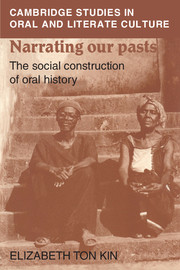Book contents
- Frontmatter
- Contents
- List of illustrations
- Acknowledgments
- Note on orthography
- Introduction
- 1 Jlao: an introductory case study
- 2 The teller of the tale: authors and their authorisations
- 3 Structuring an account: the work of genre
- 4 Temporality: narrators and their times
- 5 Subjective or objective? Debates on the nature of oral history
- 6 Memory makes us, we make memory
- 7 Truthfulness, history and identity
- Notes
- Bibliography
- General index
- Index of names
- Plate section
2 - The teller of the tale: authors and their authorisations
Published online by Cambridge University Press: 05 June 2012
- Frontmatter
- Contents
- List of illustrations
- Acknowledgments
- Note on orthography
- Introduction
- 1 Jlao: an introductory case study
- 2 The teller of the tale: authors and their authorisations
- 3 Structuring an account: the work of genre
- 4 Temporality: narrators and their times
- 5 Subjective or objective? Debates on the nature of oral history
- 6 Memory makes us, we make memory
- 7 Truthfulness, history and identity
- Notes
- Bibliography
- General index
- Index of names
- Plate section
Summary
Every tale has to have a teller. In this chapter, I consider this obvious point from different directions. I discuss some of the consequences of authorship – that tales are told by tellers, and of authorisation – that they are intended to be listened to. I examine more closely the status of this narrating ‘I’: as eyewitness; as implicit subject in an impersonal account which nevertheless may be structured by reference to the teller's life; and as explicit hero, the subject of boasting and praise. All these perspectives include assumptions about the audience to which performance is directed, so that narrations always exist through a web of social relationships.
Orientation and claim: the necessity of authorship and authorization
The study of oral representations of pastness involves the study of their narrators and audiences as well, because they will affect the content and direction of the narrative. A narrative in print may be read centuries later, but it still was produced under specific social and economic conditions by authors whose attitudes to a perceived potential audience would have affected the way they presented their material. The social contexts of oral histories include the additional condition that their tellers must intersect with a palpable audience at a particular moment in time and space. What they choose to say is affected by these conditions, which also mean that they can get immediate feedback.
- Type
- Chapter
- Information
- Narrating our PastsThe Social Construction of Oral History, pp. 38 - 49Publisher: Cambridge University PressPrint publication year: 1992



